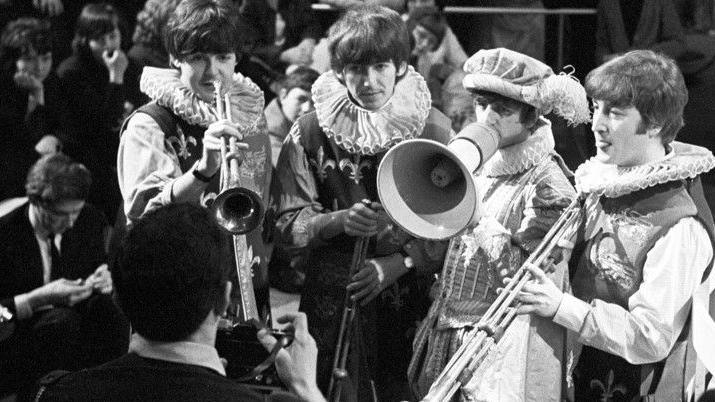Long-lost Beatles break-up notes found in drawer

The documents give a previously hidden insight into the band's demise
- Published
Long-lost notes relating to the acrimonious break-up of The Beatles will go under the hammer next week.
More than 300 pages of typed documents, compiled by the Fab Four's various advisors and legal representatives, were found in a cupboard where they had lain untouched since the 1970s.
Denise Kelly, from auctioneers Dawsons, said the "fascinating" papers were used by lawyers during an acrimonious High Court legal battle which resulted in the band's official split in 1974.
The papers will be auctioned on 12 December in Maidenhead and are expected to fetch between £5,000 and £8,000. Online bidders will be able to participate.
Dawsons did not reveal where the notes had been found, only that they had been discovered within the last year.
"I just couldn’t put them down until I had read every page," said Ms Kelly.
"As I read the minutes of meetings - notes which included discussions between the legal teams and accountants - I wondered how on earth they were going to sort everything out, and at times I could sense panic in the room as more and more complexities came to light.
"One of the lawyers even suggested during one meeting when they had gone round and round and round in circles: ‘Would it be easier if The Beatles just retired?’"
She added: "It has crossed my mind that if I were a script writer, these documents would be all I'd need to tell the real story of what led to one of the best-selling bands in history splitting up and going their separate ways."
'We had to pretend'
In 2021, Sir Paul McCartney told the BBC why he had felt compelled to "sue my mates".
Despite stepping away from The Beatles in early 1970, the band's final legal separation was not confirmed until December 1974.
McCartney said confusion over the break-up had festered because the band's new manager Allen Klein - with whom he refused to align - said he had needed time to tie up some financial loose ends.
"So for a few months we had to pretend," McCartney recalled.
"It was weird because we all knew it was the end of The Beatles but we couldn't just walk away."
McCartney ended up suing his bandmates in the high court because he wanted to keep their music out of Klein's hands.
"I had to fight and the only way I could fight was in suing the other Beatles, because they were going with Klein," he explained.
Listen to the best of BBC Radio Merseyside on Sounds and follow BBC Merseyside on Facebook, external, X, external, and Instagram, external. You can also send story ideas to northwest.newsonline@bbc.co.uk, external and via Whatsapp to 0808 100 2230.
Related internet links
Paul McCartney says John Lennon split the Beatles
- Published11 October 2021
Macca: Ono 'didn't split Beatles'
- Published28 October 2012
In 1967, when The Beatles' manager of five years, Brian Epstein died suddenly, the true extent was revealed of their finances and their mismanagement as a result of Epstein's had dubious business decisions.
The discovered court documents, which cover the 1967-70 period, show that money was unaccounted for and the band’s taxes had not been paid for years.
The band decided to form their own company called Apple Corps, which they hoped would ensure their business interests were protected but they fell out over Klein.
The band's last commercial gig was on August 29 1966 at Candlestick Park in San Francisco, California but their final live performance came playing on the roof of their Apple Corps headquarters in London's Savile Row 30 January 1969.